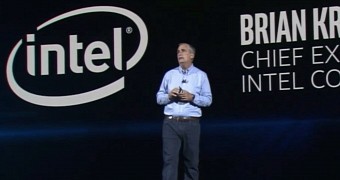Intel’s press conference was one of the most eagerly-awaited moments at this year’s CES show, mostly following the security vulnerabilities in the company’s chips and disclosed last week.
But contrary to what people expected, Intel’s CEO Brian Krzanich has spent less than two minutes discussing the hardware bugs, and a big part of the stage time granted to Meltdown and Spectre vulnerabilities was just a reiteration of the words the company said in the official press release.
Krzanich emphasized that Intel wanted to keep customers safe, explaining that “we have not received any information that these exploits have been used to obtain customer data.”
Oddly enough, while Intel’s priority was to ensure users were protected, the CEO refused to answer one important question: why hasn’t the company rolled out patches faster, especially given that Google informed them about the two vulnerabilities in the summer of 2017?
No word on stock sale
Krzanich went on to thank the industry for helping deliver patches so fast, with a slide displayed to the audience pointing to the announcements made by the top tech giants, including Microsoft, Apple, and Google.
The executive used the same words as in the press release, saying that an impact on system performance is workload-dependent, adding that it’s working to reduce this effect with further updates.
“We'll continue working with the industry to minimize the impact on those workloads over time,” Krzanich continued.
No other details were shared during the two-minute talk about the biggest hardware vulnerabilities discovered in a long time, but Intel preferred to dedicate nearly 20 minutes to the performance of a virtual band in the opening of the keynote.
Intel’s CEO also refused to touch another critical subject, as it’s now being reported that the US Securities & Exchange Commission might be examining Krzanich’s sale of a large chunk of company stock in November, only a few months after learning about the critical security flaws in its chips. Intel said the sale and the private vulnerability disclosure aren’t related.

 14 DAY TRIAL //
14 DAY TRIAL //